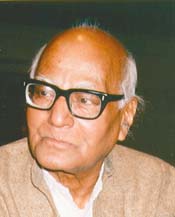|
The wittiest mind in Delhi > Page 1

Ram Swarup (1920-98): outline of a biography
by Koenraad Elst, Leuven (Belgium), January 8, 1999
In the long run, Ram Swarup will probably prove to have been the most influential Hindu thinker in the second half of the 20th century. He has, at any rate, been a crucial influence on most other Hindu Revivalist authors of the last couple of decades.
Ram Swarup was born in 1920 as the son of a rais/banker in Sonipat, HAryana, in the Garg gotra of the merchant Agrawal caste. He was a good student and earned a degree in Economics from Delhi University in 1941. He joined the Gandhian movement and acted as the overground contact ("postbox") for underground activists including Aruna Asaf Ali during the Quit India agitation of 1942. He spent a week in custody when a letter bearing his name was found in the house of another activist, the later homeopath Ram Singh Rana. After his release, and until the end of the war, he worked as a clerk in the American office in Delhi which had been set up in the context of the Allied war effort against Japan.
In that period, his wit made him quite popular in progressive circles in the capital. He was a declared socialist, a great fan of Aldous Huxley and a literary imitator of George Bernard Shaw. In 1944, he started the "Changers' Club", alluding to Karl Marx's dictum that philosophers have interpreted the world instead of changing it. Of course, it was never more than a discussion forum for a dozen young intellectuals, including the future diplomat L.C. Jain, the future Planning Commission member Raj Krishna, future Times of India editor Girilal Jain, and historian Sita Ram Goel. At that time, Ram Swarup was a committed atheist, and in the Changers' Club manifesto he put it in so many words: "Butter is more important than God."
|